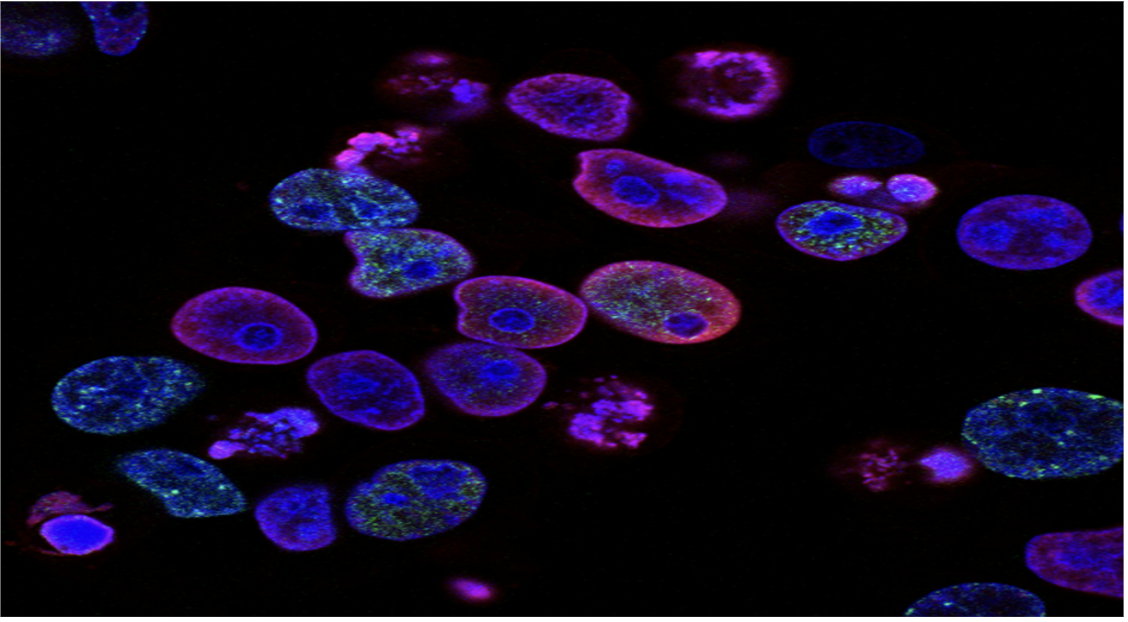PRESS RELEASE
By: News Direct
February 5, 2025
New Prostate Cancer Hope? Bayer-Funded Phase 2 Study To Test Combination Of RedHill's Opaganib And Bayer’s Darolutamide, To Overcome Androgen Resistance
By Meg Flippin Benzinga

It is often said that, “Prostate cancer is the cancer you die with, not because of,” but according to RedHill Biopharma (NASDAQ: RDHL), based on data published in Frontiers in Public Health, around 400,000 men a year worldwide would probably disagree with that statement.
With global prevalence set to double to 2.9 million cases a year by 2040, early detection of prostate cancer (PC) often leads to a favorable outcome, with many patients thankfully responding very well to treatment. However, RedHill says around 20% of men with prostate cancer will either not respond to the current standard of care androgen receptor signaling inhibitor therapies, or will become resistant to these drugs, and will advance to a point where current treatments offer no additional hope.
Patients who develop what is known as metastatic castrate-resistant prostate cancer (mCRPC) and are not responsive to hormone therapy, are left with virtually no treatment options. Invariably, they will go on to die from their cancer, the company says.
But potentially, there may be some hope thanks to a clinical collaboration, funded by Bayer AG (ETR: BAYN), a large global pharma company, and the Ramsay Hospital Foundation, between RedHill, Bayer and Australian cancer researchers. The collaboration will involve a study to test the potentially enhancing effect of RedHill’s treatment, opaganib, in combination with Bayer’s darolutamide, in overcoming resistance to androgen receptor pathway inhibition (ARPI) treatment.
First approved in 2021, and now approved in more than 80 countries, Bayer’s darolutamide was the fastest-growing androgen receptor blocker in the U.S. and continues to enjoy a strong growth trajectory, with sales in 2024 almost doubling 2023’s numbers. With more positive clinical data unveiled last year, and the expectation of additional approvals in more markets and across more prostate cancer indications, Bayer expects sales of darolutamide to peak at around $3 billion a year – potentially making it one of the most successful drugs in the prostate cancer space.
Treating Advanced Stage Prostate CancerA major driver of prostate cancer is androgen receptor signaling, which is why using chemical castration or androgen deprivation therapy has become a standard care treatment. Unfortunately, patients with advanced PC, and in particular those who have already progressed to mCRPC, become or are resistant to it, RedHill reports. However, the company also notes that according to the results of laboratory studies involving leading ARPI therapy, darolutamide, there may be a way to boost sensitivity to therapy and potentially overcome resistance – with the addition of another drug, opaganib.
Opaganib is RedHill’s first-in-class, novel and orally-administered selective inhibitor of sphingosine kinase-2 (SPHK2). Opaganib has shown anti-inflammatory, anti-cancer and antiviral activity, and its mechanism of action, being an intracellular sphingolipid pathway modifier with multiple cell-level functions, including potential inhibition of tumor growth, supports the hypothesis that it could boost the efficacy of darolutamide, the company says.
Cancer cells can block a cell-level process called apoptosis (programmed cell death), preventing the body from getting rid of unneeded or abnormal/unhealthy cells – a critical weapon our bodies use in fighting the spread of cancer. RedHill says prior research has shown that opaganib enhances androgen receptor signaling inhibitor efficacy in vitro through simultaneous inhibition of three sphingolipid-metabolizing enzymes in human cells (SPHK2, DES1 and GCS) and may potentially provide the key to overcoming darolutamide resistance in men with mCRPC. The company says, it is opaganib’s potential ability to induce metabolic stress in tumor cells that may be at the heart of the hope this study could bring people with mCRPC.
With the prevalence of prostate cancer set to double over the next 15 years and only a 28% five-year relative survival rate in people with stage 4 prostate cancer, there is a significant need for new approaches in treating mCRPC patients.
Pinpointing Who Is Most Likely To BenefitPatients with a poor prognosis due to ARPI resistance are most likely to benefit from an opaganib/darolutamide combination treatment approach, and identifying these patients will be key, RedHill says. As such, another innovation, a companion lipid biomarker test called PCPro, will be used to identify the right patients as part of the study.
“Men with mCRPC have few treatment options available to them, and those positive for the PCPro marker of ARPI-resistance seem to have a particularly poor prognosis,” said Dr. Mark Levitt, RedHill’s chief scientific officer. “If the addition of opaganib can reduce the resistance to darolutamide therapy, this would represent a significant breakthrough in improving the ability to manage advanced treatment-resistant mCRPC for improved outcomes.”
Phase 2 Trial Launching SoonSupported by Bayer and the Ramsay Hospital Foundation, the potential effectiveness of the opaganib/darolutamide combination will be put to the test in an 80-patient phase 2 clinical trial, due to start shortly. The placebo-controlled, randomized phase 2 study will evaluate the effect of opaganib, in combination with Bayer’s darolutamide, in overcoming resistance to standard-of-care androgen receptor pathway inhibition (ARPI) treatment in men with mCRPC who have not already received the newer AR signaling inhibitors such as enzalutamide, apalutamide, darolutamide or abiraterone.
A primary endpoint of improved 12-month radiographic progression-free survival (rPFS) will be the key assessment of success in the study, but several secondary and exploratory endpoints will also be evaluated, the company noted.
“The approach of developing therapeutic combinations and the companion lipid biomarker, PCPro, in parallel, is unique in metabolic targeting in metastatic prostate cancer, and this exciting study may provide proof of concept by testing the ability of sphingosine kinase-2 (SPHK2) inhibitors, such as opaganib, to overcome resistance to ARPI treatment,” said Professor Lisa Horvath, world-renowned prostate cancer researcher and chief clinical officer and director of research at Chris O’Brien Lifehouse. Sydney’s Chris O’Brien Lifehouse is a not-for-profit, comprehensive cancer hospital, that also developed the concept of using a PCPro marker-directed opaganib/darolutamide combination approach.
“Cancer cells may block apoptosis (programmed cell death), an important cell-level process designed to help the body get rid of unneeded or abnormal/unhealthy cells – critical in fighting the spread of cancer,” Horvath said.
Trial Partners PedigreeAustralia is a global leader in the field, and the driving force behind this collaboration is Horvath and her team from Chris O’Brien Lifehouse. The trial will be led by the Australian and New Zealand Urogenital and Prostate Cancer Trials Group Ltd. (ANZUP), a leading Cancer Cooperative Trials Group specializing in conducting studies for prostate, bladder, kidney, testicular and penile cancers.
Prostate cancer diagnoses are expected to surge as the population around the world ages, and fighting this deadly disease just took on new urgency. If this combination of RedHill’s opaganib and darolutamide proves itself in this study, it may go on to play an important role in helping to improve the prospects for hundreds of thousands of men with advanced prostate cancer who currently have a very bleak outlook.
Featured photo by National Cancer Institute on Unsplash.
Benzinga is a leading financial media and data provider, known for delivering accurate, timely, and actionable financial information to empower investors and traders.
This post contains sponsored content. This content is for informational purposes only and is not intended to be investing advice.
Contact DetailsBenzinga
+1 877-440-9464
Company WebsiteView source version on newsdirect.com: https://newsdirect.com/news/new-prostate-cancer-hope-bayer-funded-phase-2-study-to-test-combination-of-redhills-opaganib-and-bayers-darolutamide-to-overcome-androgen-resistance-769476017
This press release is distributed by News Direct. Blockchain Registration, Verification & Enhancement provided by NewsRamp™. The source URL for this press release is New Prostate Cancer Hope? Bayer-Funded Phase 2 Study To Test Combination Of RedHill's Opaganib And Bayer’s Darolutamide, To Overcome Androgen Resistance.
